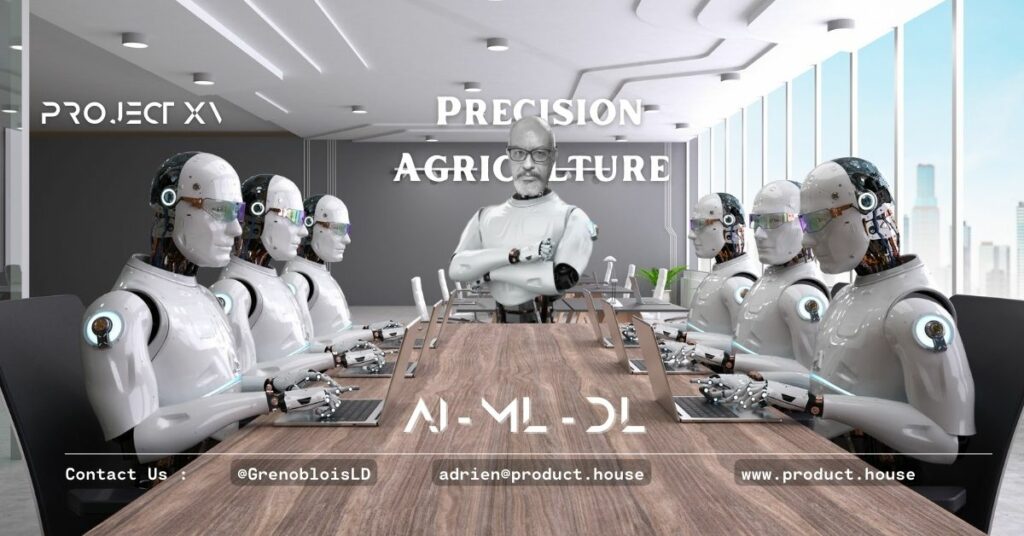Precision Agriculture: Using AI to Optimize Crop Yields and Reduce Waste

Precision agriculture, also known as precision farming, is a farming approach that uses technology to optimize crop yields while reducing waste. This approach uses sensors, drones, and other technologies to collect data on crops, soil quality, weather patterns, and other factors that impact crop growth. AI algorithms then analyze this data to determine the optimal amount of water, fertilizer, and other resources needed to maximize crop yields.
One of the key benefits of precision agriculture is that it reduces waste. By using AI algorithms to optimize resource usage, farmers can reduce the amount of fertilizer, water, and other resources they use. This not only saves money but also reduces the environmental impact of agriculture by reducing the amount of runoff and pollution.
Precision agriculture is also beneficial for farmers because it enables them to make more informed decisions. By using AI algorithms to analyze data, farmers can identify areas of their farm that need attention, such as irrigation or pest control. This can help them increase yields and reduce crop losses.
Another benefit of precision agriculture is that it can help farmers optimize their planting and harvesting schedules. By analyzing data on weather patterns and soil quality, AI algorithms can determine the optimal time to plant and harvest crops, which can help farmers maximize their yields and profits.
While there are many benefits to using AI in precision agriculture, there are also challenges that need to be addressed. One of the biggest challenges is the cost of implementing these technologies. Many farmers may not have the resources to invest in AI-powered precision agriculture.
Another challenge is the need for data privacy and security. Farmers need to ensure that their data is protected from cyber threats and that they retain ownership of their data.
Despite these challenges, the future of precision agriculture looks promising. As technology continues to advance, we can expect to see more use of AI in precision agriculture, leading to more efficient, sustainable, and environmentally friendly agriculture practices.
FAQs and their Answers:
- What is precision agriculture? Precision agriculture is a farming approach that uses technology to optimize crop yields while reducing waste. It uses sensors, drones, and other technologies to collect data on crops, soil quality, weather patterns, and other factors that impact crop growth.
- How does AI help in precision agriculture? AI algorithms are used to analyze the data collected by precision agriculture technologies to determine the optimal amount of water, fertilizer, and other resources needed to maximize crop yields.
- What are the benefits of precision agriculture? Precision agriculture reduces waste, helps farmers make more informed decisions, and can optimize planting and harvesting schedules, leading to increased yields and profits.
- What are the challenges of using AI in precision agriculture? Challenges include the cost of implementing these technologies and the need for data privacy and security.
- What is the future of precision agriculture? As technology continues to advance, we can expect to see more use of AI in precision agriculture, leading to more efficient, sustainable, and environmentally friendly agriculture practices.
Resources:
- “Precision Agriculture: Opportunities and Challenges” by John Stafford: This resource provides an overview of precision agriculture and its applications, as well as the challenges and opportunities associated with this technology.
- “The Role of Precision Agriculture and AI in Sustainable Food Systems” by Emma Stewart: This resource explores the role of precision agriculture and AI in creating sustainable food systems. It discusses the challenges and opportunities of implementing these technologies in agriculture.
Books:
- “Precision Agriculture Basics” by John Stafford: This book provides an introduction to precision agriculture, including the use of sensors, drones, and AI algorithms. It also covers the challenges and opportunities associated with these technologies.
- “Agriculture in the Age of AI” by Amit Sankhala and Dipanjan Mukherjee: This book explores the ways in which artificial intelligence is transforming agriculture, including precision agriculture, crop monitoring, and supply chain management. It also examines the ethical and social implications of these technologies.
Experts:
- Dr. John Stafford is an Associate Professor at the University of Missouri, where he specializes in precision agriculture and remote sensing. His research focuses on the use of sensors, drones, and other technologies to optimize crop yields and reduce waste. Dr. Stafford is also involved in outreach and extension activities to help farmers adopt precision agriculture practices.
- Dr. Emma Stewart is the Head of Sustainability Solutions at Autodesk, a software company that provides design and engineering software for a variety of industries, including agriculture. She leads the company’s efforts to develop sustainable solutions for food and agriculture, including precision agriculture and supply chain management. Dr. Stewart has a background in environmental science and sustainability and has authored several publications on sustainable agriculture.
Case Studies:
- John Deere: AI-powered precision agriculture for crop monitoring and optimization
- Climate Corporation: AI-powered precision agriculture for yield optimization and risk management
- John Deere: John Deere is a leading manufacturer of agricultural machinery and equipment. The company has developed an AI-powered precision agriculture platform that helps farmers optimize crop yields and reduce waste. The platform uses sensors and AI algorithms to collect data on crop health, soil moisture, and weather conditions. The data is then analyzed to provide farmers with insights into crop growth and development. Farmers can use this information to make informed decisions about irrigation, fertilization, and other crop management practices. John Deere’s precision agriculture platform has been shown to increase crop yields and reduce resource usage.
- Climate Corporation: Climate Corporation is a technology company that provides AI-powered precision agriculture solutions for farmers. Its platform uses sensors and AI algorithms to monitor crop health and predict yield. The platform also provides risk management solutions to help farmers protect their crops from weather-related risks, such as drought and flooding. Climate Corporation’s precision agriculture platform has been shown to increase crop yields and reduce the risk of crop losses due to weather-related events.
Both of these case studies demonstrate the potential benefits of AI-powered precision agriculture. By using sensors and AI algorithms to collect and analyze data, farmers can make more informed decisions about crop management, leading to increased yields and reduced waste. These technologies can also help farmers reduce their environmental impact by optimizing resource usage.
Examples of Use:
- Precision agriculture for optimizing crop yields and reducing resource usage
- AI-powered soil analysis for determining the optimal amount of fertilizer needed for crops
Glossary:
- Precision Agriculture: The use of technology, such as sensors and AI algorithms, to optimize crop yields and reduce waste.
- AI Algorithms: Computer algorithms that use artificial intelligence to analyze data and make decisions.
- Resource Usage: The amount of resources, such as water and fertilizer, used in agriculture.
- Data Privacy and Security: The protection of data from unauthorized access or cyber threats.
Quiz Questions:
- What is precision agriculture?
- How does AI help in precision agriculture?
- What are the benefits of precision agriculture?
- What are the challenges of using AI in precision agriculture?
- What is the future of precision agriculture?





